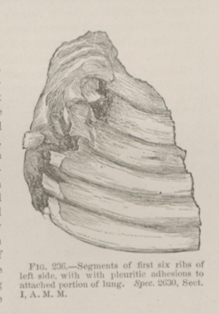Title: Robinson, C.
Source text: Surgeon General Joseph K. Barnes, United States Army, The Medical and Surgical History of the War of the Rebellion. (1861–65.), Part 1, Volume 2 (Washington, D.C.: Government Printing Office, 1870), 493.
Civil War Washington ID: med.d1e19452
TEI/XML: med.d1e19452.xml
CASE.—Private C. Robinson, Co. F, 8th New York Heavy Artillery, aged 39 years, was wounded at Cold Harbor, June 3d, 1864, by a conoidal ball, which entered the left supra-clavicular space, and emerged one inch to the left of the middle dorsal vertebræ. He was treated in the field until June 11th, and was transferred to Lincoln Hospital, Washington. When admitted, his condition was one of very great prostration; suppuration profuse and sanious. Simple dressings were applied to the wound. Death took place onJune 21st, 1864, from exhaustion. At the necropsy, the ball was found to have entered the left supra-clavicular space, passed downward through the thoracic cavity, and emerged in the middle of the dorsal region, one inch to the left of the eighth vertebra, having fractured the clavicle one and a half inches from its articulation with the acromion process, also the first, second, third, fourth, fifth, and sixth ribs, close to their attachment to the spine and grooved the posterior surface of the lung, left upper portion. On opening the body the veins were found turgid with exceedingly thin blood, which flowed out in large quantity. The right lung was attached to the wall by recent adhesions, and the left lung by older adhesions. The left cavity contained about two quarts of bloody serous fluid. The upper lobe of the right lung presented two large bullæ, filled with thin blood. There was a wound three and a half inches long in the posterior portion of the upper lobe of the left lung. The base of the lower left lobe was carnified. The fractured clavicle and injured ribs were contributed to the Museum, with the foregoing memoranda, by Acting Assistant Surgeon H. M. Dean. The clavicle is No. 3460 in the Surgical Section. The ribs are represented in the accompanying wood-cut (FIG. 236).
